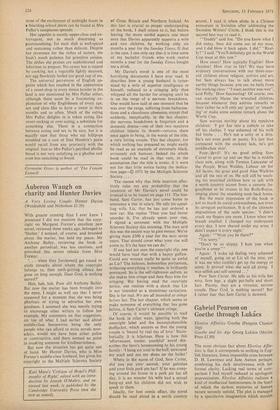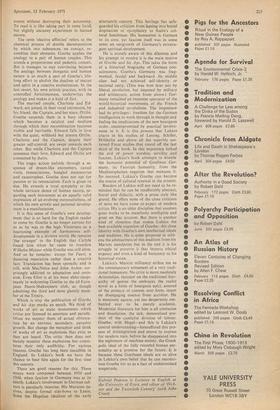Gabriel ,Pearson on Goethe through Lukics
The most obvious fact about Elective Affin, ities is that it corresponds to nothing in Eng- lish literature. Some impossible cross between D. H. Lawrence and Jane Austen perhaps, combining his dark intuitiveness with her formal clarity. Lacking real terms of com- parison I find myself reduced to apologetic impressionism. Elective Affinities radiates a kind of intellectual luminousness in the heart of which the darkest mysteries of human nature serenely unfold. The plot is managed by a speculative imagination which moulds
events without destroying their autonomy. To read it is like taking part in some lucid, but slightly uncanny experiment in human nature.
The term 'elective affinities' refers to the chemical process of double decomposition by which two substances, on contact, re- combine their elements. Goethe applies the analogy to a pair of human couples. This sounds a preposterous and pedantic conceit.
But it manages to stay convincing because the analogy between inorganic and human nature is so much a part of Goethe's life- long effort to abolish the dualism of matter and spirit in a creative evolutionism. In the last resort, his own artistic practice, with its controlled fortuitousness, underwrites the analogy and makes it a kind of fact.
The married couple, Charlotte and Ed- ward, are joined, in their rural retirement, by his friend, the Captain, and her niece, Ottilie.
Goethe suspends them in a busy idleness which becomes a catalyst and medium through which their recombination becomes visible and inevitable. Edward falls in love with the quiet, withheld but intense Ottilie.
Charlotte and the Captain, despite their greater self-control, are swept towards each other. But while Charlotte and the Captain renounce their love, Edward and Ottilie are consumed by theirs.
The tragic action unfolds through a se- quence of dream-like encounters, casual
visits, renunciations, bungled manoeuvres and catastrophes. Goethe does not opt for passion or its renunciation. Each is given its due. He extends a total sympathy to the,
whole intricate dance of human nature, re- garding each movement as an equally valid expression of an evolving purposefulness, of which his own artistic and personal develop- ment is a manifestation.
It •is this sense of Goethe's own develop- ment that is so hard for the English reader to come by. Goethe is no longer current for us as he was to the high Victorians as a heartening example of harmonious self- development in a divisive world. He remains 'the stranger' to the English that Carlyle found him when he came to translate Wilhelm Meister while Goethe was still alive.
And so he remains: except for Faust, a daunting reputation rather than a creative fact. Translation has been sporadic and is still, with MacNeice and John Arden, sur- prisingly addicted to adaptation and omis- sion. Even Eliot is at his most elder-states- manly in welcoming Goethe to the all-Euro- pean Dante-Shakespeare club, as though admitting the third and most ghostly mem- ber of the Trinity.
Which is why the publication of Goethe and his Age marks an epoch. We think of works of art as static monuments which critics are licensed to annotate and parade.
Often we suspect them of actual obfusca- tion by an envious, secondary, parasitic growth. But change the metaphor and think of works of art as explosions that exist as they are heard. The critic then does not merely monitor these explosions but consti- tutes their only audibility. For various reasons, Goethe has long been inaudible in England. In Lukics's book we have the chance to hear him again for the first time this century.
There are good reasons for this. These essays were composed between 1934 and 1940, when fascism in Germany was at its zenith. Lukics's involvement in German cul- ture is peculiarly intestine. His Marxism de- rives, despite formal side-bows to Lenin, from the Hegelian idealism of the early nineteenth century. This heritage has safe- guarded his criticism from lapsing into brutal dogmatism or sycophancy to Stalin's cul- tural henchman. His humanism is German to its core, yet fascism itself was in some sense an outgrowth of Germany's extrava- gant spiritual development.
He is acutely aware of this dilemma and his attempt to resolve it is the main motive of Goethe and his Age. This takes the form of a historical biography of German con- sciousness. Goethe's Germany was frag- mented, feudal and backward. Its middle class had not achieved self-identity or national unity. (This was won later not by liberal revolution, but imposed by military and aristocratic action from above.) Ger- many remained an impotent spectator of the world-historical movements of the French and industrial revolutions. The impotence had its privileges: freedom for the German intelligentsia to work through in thought and feeling the implications of the new bourgeois order, uncompromised by practical involve- ment in it. It is this process that Lukacs charts in his studies of Lessing, Schiller, Helderlin and above all the superbly sus- tained Faust studies that round off the last third of the book. In this impotence lurked the evil of power worship, servility and fascism. Lukacs's book attempts to wrestle the humanist potential of Goethean Ger- many, its Faustian humanity, from the Mephistophelian negation that menaces it. So\ restored, Lultics's Goethe can become the source of cultural renewal in the present.
Readers of Lukacs will not need to be re- minded that he can be insufferably abstract, literal and didactic, with .a prose style like gravel. He offers none of the close criticism of texts we have come to expect of modern critics. His is an older discipline that assumes great works to be manifestly intelligible and great on that account. But there is another kind of closeness that makes Lukacs the best available expositor of Goethe—his close identity with Goethe's own intellectual ideals and tradition. He is quite prepared to criti- cise the abstractness of this tradition from his Marxist standpoint but in the end it is his struggle to preserve it that imparts ethical urgency and even a kind of buoyancy to his historical vision.
Lukacs's Marxist militancy strikes me as the contemporary armament of a very tradi- tional humanism. No critic is more resolutely Aristotelian, insistent on the traditional hier- archy of genres (he embraces the realist novel as a form of bourgeois epic), assured of the primacy of content over form, intent on disengaging essence from accident. He is massively square, yet too desperately em- battled ever to be merely academic. Modernist literature for him is all confusion and dissolution, the sick, demoralised pro- duct of the capitalist division of labour. Goethe, with Hegel—and this is Lukacs's central understanding—foresuffered this pro- cess of disintegration and strove to express for modern man, before he disappeared into the nightmare of machine society, the Greek polls ideal of the fully rounded human per- sonality as a promise for the future. It is because these Goethean ideals are so alive in Lukdcs's own belief that he can reconsti- tute Goethe for us as a fact of undiminished magnitude.
Gabriel Pearson is Lecturer in English at the University of Essex, and editor of 'Dick- ens and the Twentieth Century' (with John Cross)



































 Previous page
Previous page